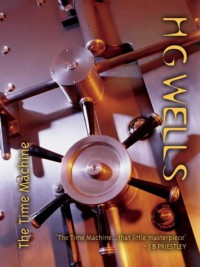1
Followers
2
Following
The Classics Companion
I have a (small) obsession with books and tv shows. Proud geek.
The Time Machine
 HG Wells' The Time Machine: Politics and Time Travel Mixed After reading The War of the Worlds over the summer (In my 'classic science fiction' phase), I knew I loved H.G. Wells', but it wasn't until I read 'The Time Machine' that I really realised how much. If you're not a fan of different futuristic societies, then you probably wont like it, but for someone studying Sociology, it really was a fantastic read. It's also considered to be the novel that kick-started the concept time-travel through a vehicle (Doctor Who, woo!) and is actually where the term 'time machine' originates from.The general plot line is that the 'Time-Traveller', a mad scientist essentially, creates a time machine and goes far into the future, expecting to understand how humanity has grown and developed since the Victorian era. What he didn't expect to find, was a completely different society, where humans had split off into two distinct creatures - the Eloi, a society of small, elegant, childlike adults, and the Morlocks, a horrendous ape-like species that have a severe aversion of sunlight. The Time-Traveller loses his time machine, and consequently through his hunt for it, learns the ins and outs of the new human society. I use the term 'human' very very lightly, the society we know today, and what Wells knew in the late 1800's, is practically diminished, with any form of writing disappeared, the language completely changed, and the whole mindset of humans gone. Instead, there is joy, and happiness, with the Eloi, much like William Blake presents as innocence in his Songs. It's very, very interesting.What I found most interesting however, was Wells' movement of Marxism (which originates 50 years before the novel was published) from a purely ideological view to one that adapts human physical characteristics. It is essentially Wells warning us of what will happen if Capitalism continues.The Eloi represent the upper class, whose wealth has turned them into lazy, weak and ultimately dependent creatures. The Morlocks, were pushed underground for so long that they become their own species, nocturnal and able to handle light. Somewhere along the line, the Morlocks run out of food, and start hunting their superiors, who are now defenceless due to their own idleness.The Time Machine, for me, marks the clear start of science fiction, especially the dystopian fiction where the world is 'dying'. It's fantastically written, with the narrator actually taking a back seat, and instead is listening to a fantasy-sounding story from a mad scientist who claims he's just gone into the future. Ultimately, he ends up believing him. Why? It sounds believable, especially in Victorian times when the difference between the upper and working class were so distinct. It's oddly a simple read, and short, but holds so much creation in it, that it's a truly ingenious.
HG Wells' The Time Machine: Politics and Time Travel Mixed After reading The War of the Worlds over the summer (In my 'classic science fiction' phase), I knew I loved H.G. Wells', but it wasn't until I read 'The Time Machine' that I really realised how much. If you're not a fan of different futuristic societies, then you probably wont like it, but for someone studying Sociology, it really was a fantastic read. It's also considered to be the novel that kick-started the concept time-travel through a vehicle (Doctor Who, woo!) and is actually where the term 'time machine' originates from.The general plot line is that the 'Time-Traveller', a mad scientist essentially, creates a time machine and goes far into the future, expecting to understand how humanity has grown and developed since the Victorian era. What he didn't expect to find, was a completely different society, where humans had split off into two distinct creatures - the Eloi, a society of small, elegant, childlike adults, and the Morlocks, a horrendous ape-like species that have a severe aversion of sunlight. The Time-Traveller loses his time machine, and consequently through his hunt for it, learns the ins and outs of the new human society. I use the term 'human' very very lightly, the society we know today, and what Wells knew in the late 1800's, is practically diminished, with any form of writing disappeared, the language completely changed, and the whole mindset of humans gone. Instead, there is joy, and happiness, with the Eloi, much like William Blake presents as innocence in his Songs. It's very, very interesting.What I found most interesting however, was Wells' movement of Marxism (which originates 50 years before the novel was published) from a purely ideological view to one that adapts human physical characteristics. It is essentially Wells warning us of what will happen if Capitalism continues.The Eloi represent the upper class, whose wealth has turned them into lazy, weak and ultimately dependent creatures. The Morlocks, were pushed underground for so long that they become their own species, nocturnal and able to handle light. Somewhere along the line, the Morlocks run out of food, and start hunting their superiors, who are now defenceless due to their own idleness.The Time Machine, for me, marks the clear start of science fiction, especially the dystopian fiction where the world is 'dying'. It's fantastically written, with the narrator actually taking a back seat, and instead is listening to a fantasy-sounding story from a mad scientist who claims he's just gone into the future. Ultimately, he ends up believing him. Why? It sounds believable, especially in Victorian times when the difference between the upper and working class were so distinct. It's oddly a simple read, and short, but holds so much creation in it, that it's a truly ingenious.



